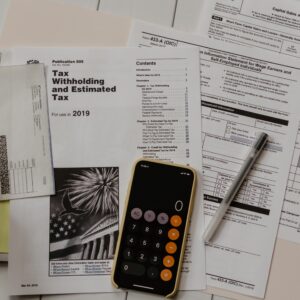
If you owe back taxes to the IRS, some amount of panic is understandable. After all, the Internal Revenue Service has the power of the federal government in its corner, something no other debt collector can claim. They are considered the most brutal collection agency on the planet.
It is easy to freeze up and just do nothing when you owe back taxes to the IRS, but hiding from, or doing nothing about your tax debt will not make it go away. In fact, ignoring the taxes you owe will only make the situation worse, since interest and penalties can really add up. You also risk having your paycheck garnished (the IRS does not need a court order to do this) or your bank account levied. The IRS can also file a Notice of Federal Tax Lien making it all but impossible to obtain financing for a car or home.
So instead of panicking about your tax debt and hoping the problem will go away, you need to take some proactive steps. Now is not the time to panic and hide – now is the time to start taking action.
Some of these steps you can do on your own if you’d like, while others will likely require the intervention of an experienced tax resolution expert. Here are some proactive steps you can take to get a handle on your tax debt. If you need help resolving your IRS tax problem, contact us here Get help from Ron Friedman, CPA. We help people with IRS problems every day.
Confirm the Amount Owed
When you owe back taxes, one of the first things you should do is make sure you really owe the money. The IRS has been known to make mistakes, a lot of mistakes, and the agency is far from foolproof. Contact the IRS or have us do an IRS transcript analysis to determine the amount the IRS claims you owe.
Seek Out Deductions You May Have Missed
At the very least, you may not owe as much as you think you do, and every dollar you can remove from the bill is one more dollar in your favor. Now is the time to scour your past and current tax returns, looking for deductions and tax credits you might have missed.
Unless you are a seasoned tax expert, you will probably need some professional assistance to make this happen. If you are already working with a CPA or tax expert, you can ask them to look at your past tax returns but only a tax resolution expert, who helps people like you for a living, can protect your income and assets as you go through the process.
If you missed a few deductions and tax credits along the way, your tax professional can file amended returns on your behalf, lowering the amount of tax debt you owe – and possibly eliminating it altogether. However, you usually can’t go back more than 3 years to amend returns.
Look for Special Programs You May Qualify For
The bad news is the IRS wants its money and has the power to collect it.
The good news is the tax agency also offers several programs tax filers can use to make the repayment process easier. In some cases, the IRS may even be willing to settle for less, possibly much less, than the total amount of back taxes you owe.
These programs are not available to everyone, and if you have the resources needed to pay your back taxes, the IRS is unlikely to give you much of a break. But if your resources are limited, the tax agency may decide that a small amount of tax repayment is better than none at all.
The first step in the process is finding the programs for which you might qualify, and that will probably require the help of an experienced tax resolution expert. Most CPAs do not have this experience. Negotiating with the IRS is not an easy thing to do, and you may need help to drive the best bargain and reduce your back taxes. In the end, it may be well worth paying a tax relief expert to negotiate on your behalf, especially if you end up with a much lower tax bill.
It is easy to panic when you owe back taxes, but you should not let fear get in your way. The longer you ignore the problem, the worse it is likely to get, and the sooner you act, the better off you, and your finances, will be. There is a solution to every IRS problem. Let us see what IRS tax debt settlement programs you qualify for today. Get help from Ron Friedman, CPA.



 Opening the mailbox and finding a letter from the IRS is frightening, but what happens next can be even scarier. The tax agency wields incredible power, and if they claim you owe additional taxes, they have many different options for forcing you to pay.
Opening the mailbox and finding a letter from the IRS is frightening, but what happens next can be even scarier. The tax agency wields incredible power, and if they claim you owe additional taxes, they have many different options for forcing you to pay. Tax season can be a stressful time, especially for freelancers who might owe taxes at the end of the year. It can be overwhelming to look at the tax debt you owe from the profits you have made.
Tax season can be a stressful time, especially for freelancers who might owe taxes at the end of the year. It can be overwhelming to look at the tax debt you owe from the profits you have made.



